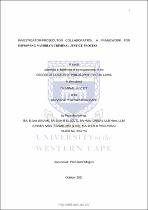Investigator-prosecutor collaboration: A framework for improving Namibia’s criminal justice process
Abstract
Namibia, analysing models, principles and approaches of interagency cooperation to determine a suitable model for Namibia. The study was based on research questions examining the trends in the Namibian criminal justice system, in respect of cooperation between investigators and prosecutors and the relevance of coordination between investigators and prosecutors in the prosecution process.
The study presents an overview of the practice in common and civil law legal systems. It recommends a hybrid of cooperation models for inter-agency agency-cooperation: a communicative cooperation model for less complex serious crimes; and a coordination model for more complex serious crimes and investigations ordered by the prosecution.
The study’s findings are that prosecutors thoroughly read the dockets at every stage of the court procedure when the docket is received from investigators, but not during the investigation stage, except for crimes falling under the Prevention of Organised Crime Act, where prosecutors assist investigators from the initial stage of an investigation. However, for other serious crimes, including murder, it is not common for prosecutors to continuously assist investigators, but they provide advice through the investigation diary. Only in a few instances that they provide assistance. The study, thus, recommends that for a given category of serious crimes to be specified in legislation, regulation and policies, there should be interagency cooperation. Cooperation should adopt a hybrid of communicative cooperation model for investigations initiated by investigators, and coordination model for investigations ordered by the prosecution. Such cooperation should further be realised within the framework of separation of powers as prosecutors should only guide the process. Inter-agency cooperation should be adopted upholding the principles of neutrality, legality, complementarity, efficiency, objective truth and well-founded conclusions.

